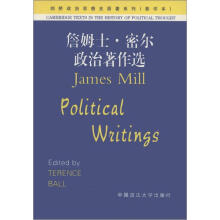剑桥政治思想史原著系列(影印本):詹姆士·密尔政治著作选
作者:詹姆士·密尔 (JAMESMill) (作者)
出版:中国政法大学出版社 2003.5
页数:317
定价:25.00 元
ISBN-10:7562023794
ISBN-13:9787562023791
去豆瓣看看 Preface
Introduction
Chronology
Bibliographical note
Biographical synopses
A note on sources
Government
Jurisprudence
Liberty of the Press
Education
Prisons and Prison Discipline
The Ballot
Appendix: Macaulay vs. Mill
T.B.Macaulay, Mill on Govemment
James Mill [Reply to Macaulay]
Index
James M111(1773-1836),is today best known as Jeremy Bentham's chief disaple and John Stuart Mil" s father. Yet Mill himself was a formidable and important Utilitarian thinker in his own nght, who earned the respect of even those who disagreed with him. His range was enormous (historian,political philosopher, psychologist, educational theorist, and economist), repeatedly crossing the disciplinary boundaries we take for granted today .
This volume presents a wide sampling of Mill's political writings and polemical essays. It begins with his classic work, the Essay on Government, and also includes pieces on the protection of nights, the importance of education, the free press, the secret ballot, and government's use ofpunishment against those who violate the rights of fellow citizens. The collection concludes with Macaulay's famous critique of the Essay, and Mill's heretofore unnoticed reply in his Fragment on Macieintosh (1835) .
This is the first time that such a selection of Mill's political works has appeared as one volume. It will be of interest to students and scholars of plitics, philosophy, and the history of ideas.TERENCE BALL is Professor of Political Science at the Uruversity of Minnesota. He has also been a Visiting Fellow at Nuffield College, Oxford, and a Visiting Professor at the University of Califomia at San Diego.
His books include: Political In novation and Conceptual Change(1989), Transforming Political Discourse (1988), Idioms of lnquiry(1987), and After Marx (1984) .
For helping me to understand the meaning of Mill's political writings I am much indebted to Isaiah Berlin, the late John Dinwiddy, Knud Haakonsen, Douglas Long, the late John Rees, Alan Ryan, Donald Winch, and William Thomas. I am also grateful to Donald Winch, William Thomas, Quentin Skinner, and Raymond Geuss for their detailed and very helpful comments on the introduction, and to Richard Fisher of the Cambridge University Press for his tact and patience.









 缺书网
缺书网 扫码进群
扫码进群